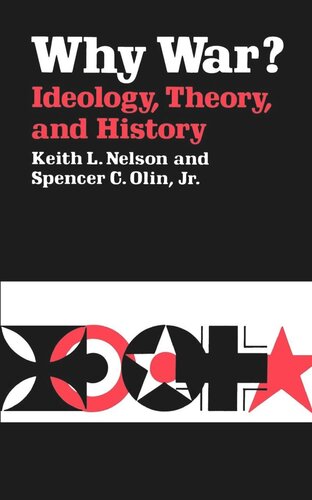

Most ebook files are in PDF format, so you can easily read them using various software such as Foxit Reader or directly on the Google Chrome browser.
Some ebook files are released by publishers in other formats such as .awz, .mobi, .epub, .fb2, etc. You may need to install specific software to read these formats on mobile/PC, such as Calibre.
Please read the tutorial at this link. https://ebooknice.com/page/post?id=faq
We offer FREE conversion to the popular formats you request; however, this may take some time. Therefore, right after payment, please email us, and we will try to provide the service as quickly as possible.
For some exceptional file formats or broken links (if any), please refrain from opening any disputes. Instead, email us first, and we will try to assist within a maximum of 6 hours.
EbookNice Team

Status:
Available5.0
40 reviews
ISBN 10: 0520342844
ISBN 13: 9780520342842
Author: Keith L Nelson, Spencer C Olin
"Instead of proposing another theory of war, their goal is a more modest one of raising the theoretical consciousness of historians. Specifically, they argue that '1) ideology does influence theory, 2) historians do have ideologies as well as theories . . . about which they are not always conscious or consistent, and 3) we can better understand, compare, and evaluate what historians are saying when we comprehend their ideological and theoretical perspectives.' They attempt then, to classify historical interpretations of war according to their ideological/ theoretical orientations, however covert." --Perspective "Nelson and Olin .. . are concerned with enhancing history's social utility by advancing its capacity to produce generalizations that can explain or predict events and are subject to empirical testing. Their exploration of historical generalization focuses on an issue itself of the highest importance, the causes of war; but their aim is also to create a model for historical generalization applicable to other issues. They argue that to understand generalizations in history, one must recognize their roots in theory, and that historians' theories in turn proceed from their own ideologies. To demonstrate, they survey theories about the causes of war that have come out of conservative, liberal, and radical ideologies. . . . any historian will profit from this rigorous approach to the problem." --Choice "Learned and suggestive, this book clarifies much of what is already known, and points toward new ways of understanding." --Library Journal
Chapter 1: Conservative Ideology and Theories of War
The pessimistic/fatalistic view of human nature and society.
War as an inherent part of the human condition or international relations.
Emphasis on power, national interest, and the balance of power.
Key thinkers and historical examples aligned with conservative thought on war.
Chapter 2: Liberal Ideology and Theories of War
The optimistic view of human progress and cooperation.
War as a deviation from rationality or a product of imperfect institutions.
Emphasis on international law, diplomacy, collective security, and economic interdependence.
Key thinkers and historical examples aligned with liberal thought on war.
Chapter 3: Radical Ideology and Theories of War
War as a product of class struggle, economic systems (e.g., capitalism, imperialism), or structural inequalities.
Emphasis on revolutionary change to eliminate the root causes of conflict.
Critique of conservative and liberal explanations of war.
Key thinkers and historical examples aligned with radical thought on war.
why war ideology theory and history
definition of ideology in us history
definition of ideology in world history
facing history and ourselves propaganda
why was ideology insignificant to john adams
Tags: Keith L Nelson, Spencer C Olin, War, Ideology